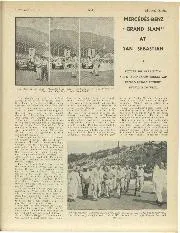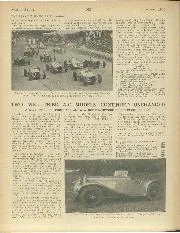

OCTOBER, 1935
MERCEDES-BENZ "GRAND SLAM" AT SAN SEBASTIAN Even though they may have suffered defeat on one or two occasions, there is little doubt that the Mercedes-Benz racing cars are the finest…
THE DUKE OF YORK’S TROPHY MOTOR-BOAT RACES.
RESULT. “
For the first time since its inception in 1924 the Duke of York’s trophy has this year gone abroad. The single American boat showed a marked superiority from the outset, and finally succeeded in carrying off the prize to the U.S.A.
The race lacked much of its usual interest this year as America was the only country to challenge Great Britain as holders of the trophy. Three French and two German boats were entered but did not materialise, and the only foreigner therefore was Mrs. J. H. Rand’s “Little Spitfire,” which was fitted with a straighteight Miller engine. The boat is very small and is undecked, the engine being only protected by a mackintosh cover.
The British team included two previous winners, the only one missing being ” Ardenrun Junior,” which won in 1925, in the form of Count Johnston-Noad’s “Miss Betty” which is now fitted with a 4-cylinder Sunbeam engine, and Miss Carstair’s ” Newg ” with an engine of the same type. The new boat was Mr. F. G.
Bersey’s “Bela,” with a Laystall engine, and owing to the fewness of the starters Miss Carstair’s other boat ” Leumas ” also took part.
The race, which was for boats with engines not exceedng 1500 c.c. was run in three stages, 30 sea miles being covered on • Saturday, August 6th, Monday, . August 8th and Tuesday, August 9th. The course was in Southampton Water, the start and finish being off the Royal Pier, Southampton.
We were anxious to see how this course compared with the Thames from the spectators’ point of view, and on the Saturday we went in a motor cruiser from the Hamble River, and anchored off the pier. The view from the anchorage however did not prove very comprehensive, and we soon transferred to a dredger which was moored in a convenient position, and from the top stage of which a slendid view could be obtained all up the course. The American boat” Little Spitfire” which had Mr. R. Snoddy at the wheel, and which carried no mechanic, was last over the line after the starting gun, but soon made good this defect and gained the lead. It was quickly apparent that she had considerably more speed than her English rivals, and once having established her lead, she was never headed. She was followed by
Newg, Miss Betty and Bela, and this order was maintained up till the end. Bela produced a great deal of noise but not very much speed, and finally gave up after completing eight of the ten laps. Speeds during the first day’s racing were as follows :-
1. “Little Spitfire” 30.6 knots 2. ” Newg ” 29.1 „ 3. ” Miss Betty” 28.0 „
On the Monday and Tuesday the journey was made to Southampton by road, and the races were watched from the pier. It must be admitted that the view was not so good as from our unofficial dredger grandstand, but the opportunity was provided of a more intimate inspection cf the boats after the races. The water on Monday was much calMer than on Saturday, but it made little difference to the relative perfonnatices of the boats. ” Little Spitfire” soon established her lead again, followed by the English boats in the same order as on the Saturday. After about half distance (15 sea miles) Bela slowed considerably and finally finished with her engine missing badly. On Tuesday she was a non starter, and only three boats therefore took part in the third race. The water was rather rough again, but ” Newg ” seemed to have found more speed, and her lap times were very little slower than those of the American boat, four of them, in fact, being actually faster. In the end “Little Spitfire” won by only 38 seconds, the speeds being :
1. ” Little Spitfire” 28.6 knots 2. ” Newg ” 28.4 3. ” Miss Betty” 23.4 „
As four points were scored for a win, two for a second, and 1 for a third, the final scoring was as follows :— America (” Little Spitfire “) 4 + 4 + 4 .12
points. England ” Newg ”) 2 + 2+ 2 .6 . 9 (” Miss Betty “) 1 + 1 + 1 –3
pts.
The Trophy therefore was won by America, which must be accounted a very fine performance as she had only one boat against three English ones. Next year, therefore, when the race is competed for the last time under the 1500 c.c. rule, we shall have to make a big effort to regain the trophy.